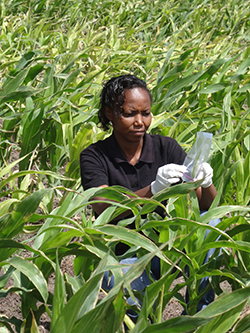Eugenia Saini is currently FONTAGRO’s Executive Secretary. FONTAGRO is the Regional Fund for Agricultural Technology. She leads the investment fund and a portfolio of 70 international operations related to science, technology, and innovation for the Latin America and the Caribbean region. She is from Argentina and is an agronomist by training. She holds a doctorate in agricultural sciences, specializing in total factor productivity analysis. One of her seminal works in this field was the estimation of 120 years of TFP for the agricultural sector in Argentina. She is also a National Public Accountant and holds an MS in Food and Agribusiness and an MS in Applied Economics, both from Universidad de Buenos Aires. She has worked in the private and public sectors, both nationally and internationally, especially in multilateral banks. She was awarded a Fulbright Scholarship at Cornell University and, more recently, with the Abshire-Inamori Leadership Academy (AILA) Scholarship at the Center for Strategic & International Studies (CSIS) in Washington, D.C.
Research Partnerships for More and Better Maize
A multi-stakeholder partnership between a CGIAR center, CIMMYT (The International Maize and Wheat Improvement Center), the U.S. Agency for International Development, and Corteva Agriscience™, the Agriculture Division of DowDuPont, with support from the Bill and Melinda Gates Foundation is focused on fighting a deadly virus that destroys maize in developing countries.

Known as maize lethal necrosis, the disease is caused by a combination of viruses which can only be treated by developing genetic resistance in the plant. With millions of smallholder farmers dependent on maize in Africa, the disease has destroyed up to 30 percent of some family maize crops and has the potential to disrupt food security and trade.

Together, CIMMYT and Corteva are researching how CRISPR-Cas9 technology (advanced breeding through gene-editing, relying on natural processes that happen in the genome, but targets those changes more precisely) may help the maize become resistant to the virus. Long-term research partnerships between institutions such as CIMMYT and Corteva help develop trust and collaborative action by bringing private-sector resources and experience to the table.
Another example of a powerful multi-stakeholder research partnership includes the Water Efficient Maize for Africa (WEMA) project, in which drought tolerant maize seed is being developed for the specific needs of African farmers. The WEMA project is the largest tropical white maize breeding program in sub-Saharan Africa. As a leading WEMA partner, Monsanto Company (recently acquired by Bayer AG) shared 600 elite parental lines of maize seed, along with technical plant breeding know-how and biotech drought-tolerant and insect protection traits. Monsanto also leveraged the expertise of local research partners to develop locally-adapted hybrid maize.
To learn more about WEMA, read Drought Tolerant Maize for Africa case study in this report.


